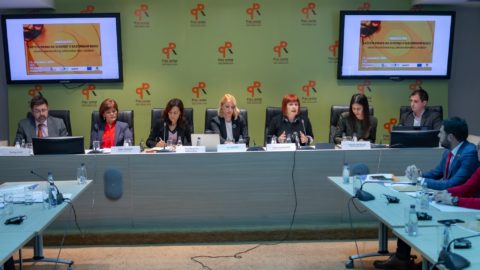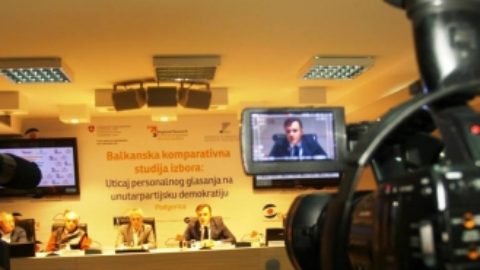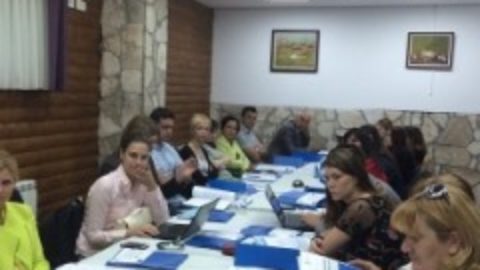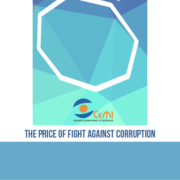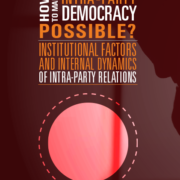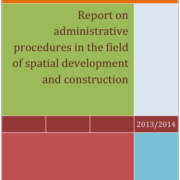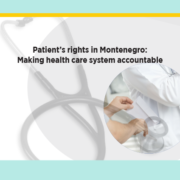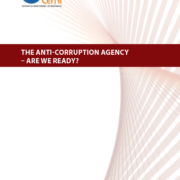On September 01, 2012 CeMI has started the implementation of the project “Women in Politics: parties and participation in politics”, supported by the Embassy of the United States in Podgorica. CeMI’s goal is to help to advance political power of young women in Montenegro, as well as to improve their presence in politics. The main aim of the project is that CeMI encourages and raises women awareness in a manner that will result in them taking more part in political processes, in increasing their presence in politics and being more active decision-making. Likewise, the project will aim to influence decision-makers in party and state authorities to pay more attention to the need for larger participation of women in politics. That way the traditional understanding of differences among genders and stereotypes rooted in traditional patriarchal Montenegrin culture will be negated.
Beneficiaries of this project are: female members of parliamentary political parties; representatives from NGOs dealing with the issue of gender equality; holders of key positions in managerial structure of political parties and state power making decisions on appointing officials and other subjects of political processes.
The project consists of four key activities:
•organizing the first generation of school ‘Women and democracy in Montenegro’;
•organizing the seminar on the subject ‘Women as a political minority in Montenegro’;
•organizing the round table ‘Traditional Montenegrin morals in the process of Montenegro’s accession to the EU and NATO’;
• the final press conference
Considering the fact that the participation of women in politics in Montenegro is far from equal and that their role and power in political processes if very limited – the project targets to contribute to raising of young women awareness and encouraging them to take more part in political and decision making process. That way, women should be acknowledged as politicians, political activists and state official. Before all other aims, the project’s aim is to tackle the traditional conceptualization of gender relations and gender differences, as well as psychological barriers women of Montenegro face when deciding on taking active part in politics.
The school ‘Women and democracy in Montenegro’ attends 30 female participants in NGOs and political parties. In deciding on participants the proportional participation of women from southern, central and northern region was taken account of. Through taking part in the educational units of the mentioned school, participants have a chance to deepen their knowledge about the sociological aspect of gender differences, political activism of women in Europe and the world; role, status and political power of women in developed countries of Western Europe; gender equality policy of European and international organization; the standards and recommendations which international community uses to condition states in the accession process; political and parliamentary power of women of Montenegro; as well as about the influence of traditional Montenegrin morals on status and position of women in political life. Participation in the school helps in participants’ liberation from the traditional patriarchal pattern and stereotypes about the jobs women can and should do, and which often result in women having difficulties to take over a certain function in a political party or a state body.
The school will conclude with holding of a three-day final seminar on the subject ‘Women as a political minority in Montenegro’. Participants in the seminar will be students of the school, decision-makers in Montenegro governmental structures (male and female MP’s of local and national Parliament, holders of key positions in the Government, as well as in the judiciary structures), and members of managerial structures in political parties.
The following questions will be analyzed during the seminar: gender equality in Montenegro; the role of woman in XXI century Montenegro; the possibilities for young women to take on important political functions in political parties and government structures; as well as the possibility for Montenegro to fulfill international and European standards and recommendations on the question of gender equality in political life, so that the country can progress further in the process of European and Euro-Atlantic integrations.
A round table on the topic of “Traditional Montenegrin Morals” in the process of Montenegrin integration in the EU and NATO will be organized within the project. The round table will be open for public and will be a forum for consideration of key reasons which inhibit women from dealing with important political questions and decision-making on big political questions. The panelists at the round table will be chosen from the group of women activists, of decision makers on important political and state functions, as well as of experts who analyze the status and the role of women in Montenegrin society.
The project will be concluded with a Press Conference. On this occasion, a presentation of concrete results of the realized activities will be presented to the public. Furthermore, a manual consisting of school activities will be distributed to the participants of the school and the seminars, as well as to the media representatives present at the press conference. Finally, concrete results of attending the school and the seminars will be presented at the press conference.
Through the seminars and the round table the project aims to bring about exchange of opinions between women who belong to different political parties, activists, non-government organizations and carriers of political functions; and to create a forum for discussion of ways of increasing engagement of women in politics and enhancing their participation in political activities. The project will also raise awareness about the need for greater degree of presence of women in politics, not only among the project participants, but also among other women who are members of political parties or activists.
School “Women and Democracy in Montenegro” – 1st generation
One of the main activities of the project “Women in Politics: Parties and Political Participation” is the organization of the 1st generation of a four-month school on the topic of “Women and Democracy in Montenegro”. The participants come from Montenegrin political parties and non-government organizations and are advocators of gender equality. The participants were chosen through a public tender and the choice was made without any consideration of religious, national, political or age background and orientation. The school numbered 30 participants who equally represented the north, the central and the south of Montenegro, in proportion to the number of women populating the particular area.
The lectures were organized once or twice a week and held in the PR center, a space which contains all of the necessary capacities for an organization of press conferences, round tables, workshops and seminars, as well as for the execution of thematic lectures.
The school had four modules and twenty lectures about the sociological aspect of gender differences, of political activism of women in Europe and the world, the politics of gender equality in European organizations, the role of women in media, the political and the social role of women in XXI century, the political and parliament power of women in Montenegro, the changes on the political, economic and social fields after the transition, as well as about the influence of traditional Montenegrin morals on the status and position of women in political life.
The lecturers of the school were distinguished professors, sociologists and anthropologists who work on the questions of power, and the role and status of women in Montenegrin society and politics. Among the lectures were women who fulfill specific political or state functions and have accomplished prominent results in various areas of social life in Montenegro. The lectures were conceptualized with a special attention to the active participation of all participants in discussions, open questions debates and to the leadership of interactive discussion.


 Montenegrin
Montenegrin